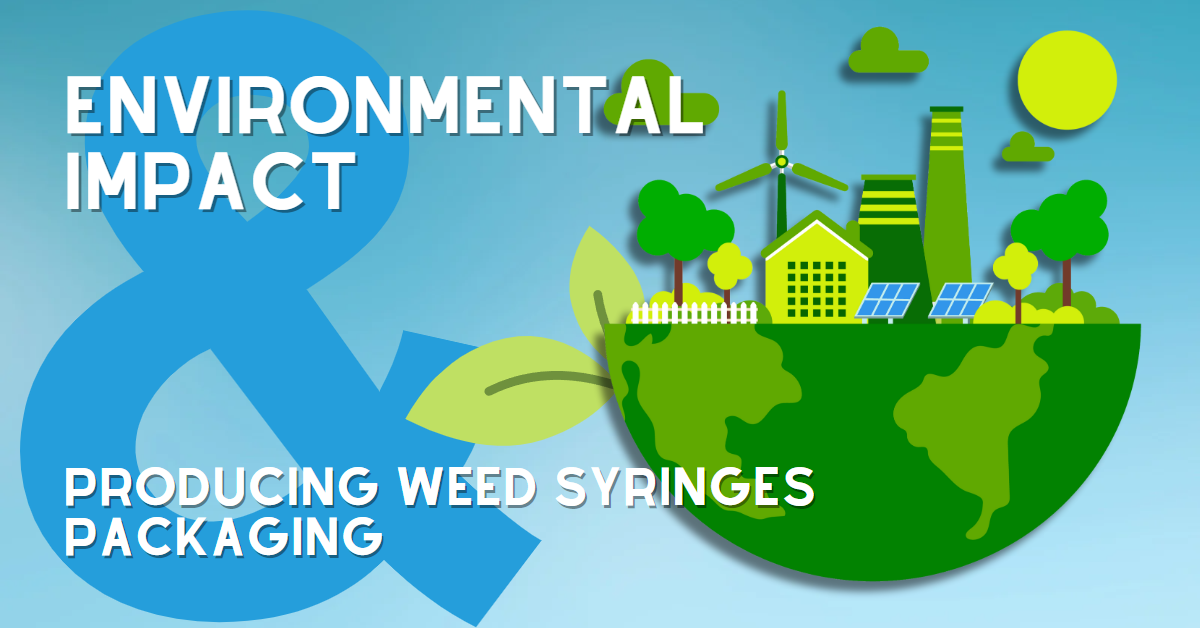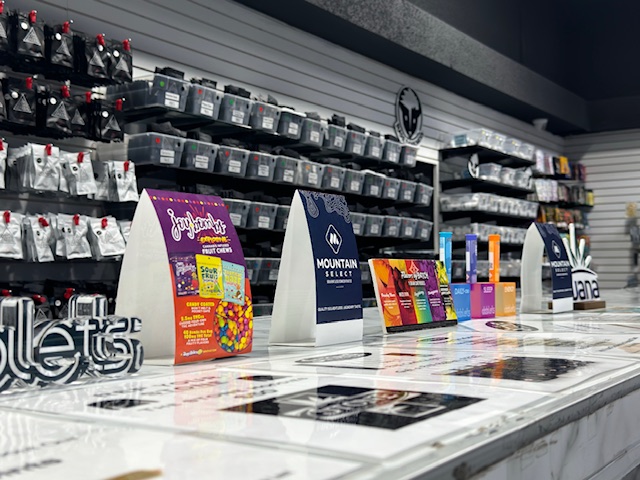
This website is for users aged 21 and over. Please confirm your age.

The environmental impact of producing weed syringes and their packaging is a growing concern in the cannabis industry. This section examines the importance of sustainable cannabis packaging and explores the harmful effects of non-recyclable, single-use plastic packaging. Additionally, we will discuss the growing demand for sustainable alternatives among cannabis consumers. And they are also highlighting the need to address this issue in a meaningful way.
Single-use plastic packaging that is not recyclable has concerning effects on the environment. It doesn’t decompose and causes waste to pile up in landfills and oceans. Plus, it relies on non-renewable fossil fuels, and transporting these resources creates pollution.
To fix this, weed businesses should adopt eco-friendly and biodegradable packaging. Consumers are more aware of this issue and want sustainable alternatives. Governments are also implementing regulations that require child-resistant packaging and encourage innovation.
Organizations are looking for ways to reduce electricity consumption from indoor marijuana cultivation. Offset funding for carbon-reducing projects can help. Also, efficient lighting and ventilation systems can reduce electricity use and increase productivity.
Weed Companies need to design sustainable cannabis packaging products. They must recognize the need to lower their environmental impact, or consumers will go to competitors. Going green is the way to go; sustainable cannabis packaging is in high demand. Therefore, helping businesses and society to create a better future.
Consumers are craving sustainable solutions to non-recyclable, single-use plastic packaging in the cannabis industry. It’s due to its harmful effects on the environment. This demand has caused a need for businesses to switch to eco-friendly packaging options that reduce waste and promote sustainability.
Cannabis companies invest in packaging materials such as biodegradable plastics, recycled paper, and glass containers. These can be reused or recycled. Not only this, but they must also maintain product quality and safety.
Adopting sustainable packaging can increase sales, consumer satisfaction, and brand loyalty. Plus, it reduces environmental damage. As consumers prioritize sustainability, transitioning from conventional plastic packaging is necessary for the cannabis business’s success.
To meet this demand for sustainable packaging, businesses must use tech supporting sustainability. For example, they can use plant-based resins and compostable materials that decompose without harming the environment.
The shift towards sustainable alternatives is critical for reducing emissions and preserving resources. The cannabis industry must embrace eco-friendly practices throughout production to meet consumer demand.
Child-Resistant Packaging is incredibly important for the weed syringe and packaging industry. It is vital to follow regulations to ensure that children do not come into contact with these products, as accidental ingestion can have severe consequences.
Manufacturers must make sure their packaging meets the requirements. It should be opaque, so children cannot see the contents, and labeled as containing THC. Warning labels should also be prominently displayed. It must be hard for children to open, but easy for adults.
Extra precautions should also be taken, ensuring packaging is durable and tamper-evident. This helps to protect consumers/children and maintain a positive reputation for the industry.
Reducing the environmental impact of weed syringes and their packaging is essential to create a more sustainable production system. However, this requires a multi-stakeholder approach involving the weed industry, packaging manufacturers, and environmental organizations. Through collaboration, they can develop eco-friendly alternatives like biodegradable and compostable materials. They can also reduce packaging size and use a cradle-to-cradle approach, where all materials are recyclable.
It is imperative to consider the environmental impact throughout the product’s lifecycle. To do this, the partnership can conduct a lifecycle analysis, looking for ways to reduce carbon emissions and waste. The weed industry can collaborate with environmental groups to fund research and development of sustainable production methods. They can also educate consumers on the importance of proper disposal of weed syringes and their packaging. By making recycling accessible and convenient, waste can be minimized.
Ultimately, collaboration among stakeholders can lead to a more sustainable production system of weed syringes and their packaging. Developing eco-friendly packaging, using a cradle-to-cradle approach, conducting lifecycle analysis, and educating consumers can all play a role in reducing environmental impact.
Indoor marijuana cultivation requires a lot of electricity. This leads to an environmental impact, including greenhouse gas emissions. A study showed that the production of weed and its packaging also pollutes.
Growing a pound of weed is estimated to use as much electricity as a refrigerator running for a year. Lights used for cultivation can generate heat. This means more energy is needed for cooling. Plus, marijuana needs a specific temperature, increasing the energy demand. All of this adds up to high electricity consumption.
The production of weed syringes and their packaging creates plastic waste. It takes hundreds of years to decompose. The packaging also contributes to the environmental impact.
To lower the environmental impact of indoor marijuana cultivation, sustainable practices should be adopted. For example, use energy-efficient LED lights, improve ventilation to reduce heating/cooling needs, and recycle packaging materials. This can reduce energy consumption, which helps both the environment and cultivators. To further decrease environmental impact, consider renewable energy sources such as wind or solar power for indoor marijuana cultivation.
Offset funds and carbon-reducing projects are increasingly used to compensate for the harmful environmental effects of specific industries, such as cannabis. Syringes and packaging products for weed have a significant impact on the environment. To reduce that impact, cannabis companies can invest in projects that reduce emissions of greenhouse gases or take carbon dioxide out of the air.
For example, investing in forest conservation projects, renewable energies, or energy-saving projects in communities can help with CO2 from syringe and packaging production. Furthermore, offset funds can be used for projects that fix the environmental damage caused by cannabis. These projects include sustainable farming, eco-friendly packaging, and renewable energy.
By investing in offset funds and carbon-reduction projects, the cannabis industry can make a difference in its carbon footprint and promote sustainability. Not only will this help reverse the environmental damage, but it will also show responsibility and help create a cleaner future.
Creating more effective lighting and ventilation systems is necessary to reduce the environmental impact of weed syringe and packaging production. Implementing such methods in cannabis grow operations reduces energy usage and associated greenhouse gas emissions.
To show the potential benefits, a table illustrates current energy consumption, potential savings, estimated cost of implementation, and greenhouse gas reductions. This table provides data, boosts a company’s image, and appeals to eco-friendly customers.
Furthermore, more efficient lighting and ventilation systems can increase profits for cannabis growers due to decreased operating costs. For instance, LED lights and HVAC systems are options that can considerably cut energy consumption while offering better accuracy and control over growing conditions. Companies can show their commitment to sustainability and responsibility by using them.
Sustainable packaging for cannabis products is crucial due to the high demand for packaging to comply with legal requirements, ensure safety and security, and preserve freshness. Many companies have opted for non-recyclable, single-use plastic packaging, which harms the environment and wildlife. Sustainable cannabis packaging is essential for reducing packaging waste and minimizing the industry’s environmental impact.
Consumers increasingly seek sustainable alternatives and brands offering sustainable packaging options as a selling point for cannabis companies. With the growing awareness about environmental issues, consumers are more conscious and prefer weed companies that use sustainable materials and eco-friendly practices.
Many states have regulations requiring cannabis products to be sold in child-resistant packaging, which can contribute to waste. However, sustainable packaging options can help reduce this waste. Companies must comply with legal requirements and provide safe and secure packaging options while considering sustainability. The best for environmental impact is always good overall.
Producing weed syringes and their packaging can have a significant environmental impact due to the high demand for packaging, the use of single-use plastic, and the energy consumption required to produce them. Considering sustainable packaging options and reducing the industry’s environmental impact is crucial.
Boulder County is collaborating with local cannabis cultivators to reduce their environmental impacts while reducing production costs. Commercial cannabis cultivators are required to offset their electricity use with local renewable energy or pay a 2.16 cent charge per kWh. The fees from this surcharge go into the Boulder County Energy Impact Offset Fund, which can be used to educate and support best practices for energy usage and therefore fund other carbon pollution-reducing projects.
The NCBI website at www.ncbi.nlm.nih.gov has temporarily blocked access due to a possible misuse/abuse involving the user’s site. This is not a security issue like a virus or attack. The problem could be simple as a runaway script or not using E-utilities efficiently. Using E-utilities efficiently can prevent the user’s work from impacting other researchers’ ability to use the site. To restore access and avoid this in the future, the user’s system administrator should contact info@ncbi.nlm.nih.gov.
We warmly welcome you to explore our highly acclaimed strains, concentrates, and edibles. Serving recreational clients with pride is our passion.
At our dispensary, you'll find a professional yet inviting atmosphere that prioritizes your comfort and privacy. Feel free to stop by at your earliest convenience to experience it for yourself. We can't wait to serve you!


